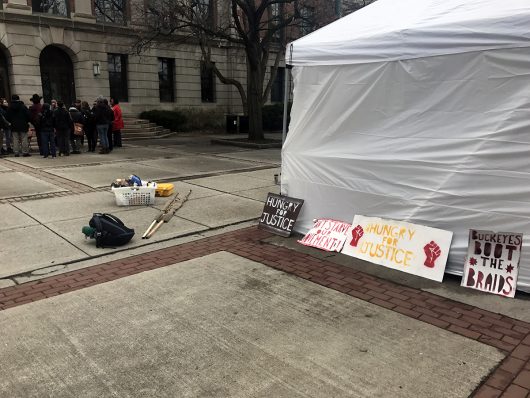
Javaune Adams-Gaston, senior vice president for student life, meets with students hosting a hunger strike outside of Bricker Hall to protest the university’s contract with Wendy’s on March 20. Credit: Summer Cartwright | Senior Lantern Reporter
Students from the Ohio State Student/Farmworker Alliance will cut more than just Wendy’s out of their diet this week. On Monday, members began a weeklong fast coupled with a daily presence outside of Bricker Hall in protest of OSU’s contract with Wendy’s.
Members of the Student/Farmworker Alliance said the purpose is to intensify pressure on the university to end its current contract with Wendy’s.
The Student/Farmworker Alliance is demanding Wendy’s join the Fair Food Program and adhere to its standards for tomato pickers. The program has added 14 major corporations to its program, including McDonald’s, Burger King, Chipotle and Wal-Mart, but it hasn’t convinced Wendy’s to join.
The Fair Food Program, the Coalition of Immokalee Workers — a workers’ rights organization — and the Alliance for Fair Food work together to ensure the protection of rights and wages for farmers and farmworkers in Immokalee, Florida, according to their websites. Unlike McDonald’s and Burger King, for example, which buy tomatoes from farms in Florida that are protected by the Fair Food Program’s code of conduct, Wendy’s gets its tomatoes from Mexico.
“We are fasting to prove to the administration that our demands have not yet been met, and that means they must end the contract,” Alex Hoey, a second-year in geography and member of the Student/Farmworker Alliance, said in an email referring to OSU’s contract with Wendy’s.
OSU spokesman Ben Johnson said the university remains committed to continuing its work on this issue, but emphasised “the university does not support any potentially harmful actions that could jeopardize the health and well-being” of students.
OSU’s contract with Wendy’s, which leases a location at the Wexner Medical Center, states the school will work to find “a resolution of the concerns of the Student Farmworkers Alliance regarding the procurement of tomatoes for the operation of Tenant’s business at the Premise that is satisfactory to Landlord in its sole discretion.”
Previously, the university set up a meeting between Wendy’s and the Student Farmworkers Alliance, but the group declined to meet, citing a message posted to Wendy’s website dating from 2013. In the statement, which has since been updated and changed, Wendy’s said it was being targeted by CIW and that the restaurant should only have to negotiate directly with the supplier, not a third-party organization like CIW.
The group plans to meet outside Bricker Hall at 8:30 a.m. every day this week and hold open meetings at 4 p.m., where administration members are invited to join the discussion. Group member Ben Wibking, a graduate student in astronomy, said the meetings are designed to foster “meaningful conversation” with the administration, but ultimately to get OSU to end its contract with Wendy’s as soon as possible.
“We want (University President Michael Drake) to come and explain that if they can end their Wendy’s contract now, why aren’t they doing that,” Wibking said.
The weeklong fast outside of Bricker Hall will be paired with daily protests outside of the Wendy’s headquarters in nearby Dublin, Ohio, demanding that Wendy’s join the Coalition of Immokalee Workers and the Fair Food Program, according to a press release from the CIW. The CIW is hosting a march through Columbus on Sunday to mark one year of its campaign to boycott Wendy’s.
Laura Kington, an OSU alumna and member of Ohio Fair Food, said the fast was in solidarity with the farmworkers who the group says Wendy’s is exploiting.
“Wendy’s has the fundamental responsibility to listen to the farmworkers who make their profits possible, and to listen to their own neighbors here in Columbus,” Kington said in a press release.
Wendy’s recently updated code of conduct states that all suppliers are expected to comply with the respective labor laws accepted in that country. For farmworkers in Mexico, tomato suppliers must comply with the Universal Declaration of Human Rights and the International Labor Organization, and Wendy’s encourages suppliers to respect human rights.
The update also stated that Wendy’s might meet with third-party groups and governmental organizations “with the intent of furthering our responsibility commitments and sustainability stewardship.” However, no third-party groups were mentioned by name in the update.


